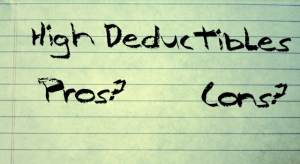Several states experienced the first catastrophe of 2014 when temperatures fell into the single digits. Pipes froze, burst and caused substantial water damage. Insurance claims were filed but policyholders didn’t realize they had a deductible or how much the deductible was and how it effected the policy.
State Farm, the leading property insurer in the US, recently increased home policies deductibles to the greater of $1,000 or .5% of Coverage A (Dwelling Coverage). For example, if your home is insured for $500,000 your deductible would be $2,500. This was a surprised to several policyholders who used to have a $250 or $500 deductible.
Home ownership is part of the American dream, and often, homes are the largest investment most people make during their lifetimes. When you have a large part of your finances tied up in your home, you want the most cost-effective yet serviceable homeowners insurance policy possible. For some, this means having the right deductible in place.
The Deductible Amount That Works for You
Typically, homeowners insurance deductibles begin at $250. Depending on your policy, your premium can be reduced by changing your deductible with general savings of:
- Up to 15 percent for a $500 deductible
- Up to 25 percent for a $1,000 deductible
- Up to 30 percent for a $2,500 deductible
- Up to 35 or more for a $5,000 deductible
While the additional discount savings for a very large deductible may look appealing, deductibles of more than $1,000 are not permissible with most mortgage companies. Check with your mortgage lender first, if you are considering a deductible in excess of $1,000.Of course, large deductibles mean you are on the hook for part of the repair or replacement cost should you need to file a claim. So, unless you have the cash on hand, a large deductible could be a drawback at claim time.
Claim Frequency and Homeowners Insurance Deductibles
Typically, insurance claims are made infrequently so the amount saved on monthly bills makes up for the additional amount of deductible needed for a claim. A higher deductible can be especially advantageous if you have a history of limited claims. For people that have a history of filing a large number of claims or those that live in high risk areas, an increased deductible may not provide savings over time.
Keeping an Emergency Fund to Cover Your Deductible
Larger deductibles can be advantageous, but you also agree to accept the financial obligation of having a higher deductible. Be sure you can afford to pay the amount of your deductible if needed. It is important to be prepared and have the finances available to cover the cost of your deductible if you have to file a claim.
Since you have to pay the cost of a deductible upfront before your coverage begins, an emergency fund can be helpful. The money you save can by having a higher deductible can be put into a savings account or other safe easy-to-access place. If you ever need to file a claim, an emergency fund can eliminate unnecessary financial strain. No one ever knows when something will happen and a claim will be needed. Having safeguards in place in the form of an emergency fund can bring peace of mind.
Other Homeowners Insurance Deductible Considerations
The price of homeowners insurance can vary with the deductible amount included in the policy. Deductibles vary depending on what kind of homeowners coverage you have and other factors. If you live in what is considered to be a disaster-prone region, certain forms of damage including, hail storms, windstorms, earthquakes may have a separate deductible.
Reviewing Your Homeowners Insurance Policy
One way to save money on your homeowners insurance is to carefully review the deductible amount on your policy. You can then evaluate the deductible amount you currently have to see what savings a lower deductible could provide.
Contact The Andrew Agency today to discuss your personal situation and your options. We help clients obtain the right insurance for homes in Richmond, Virginia, Maryland and South Carolina. We can help you find the protection you need at a price you can afford. Call us today at (804) 320-2886.













